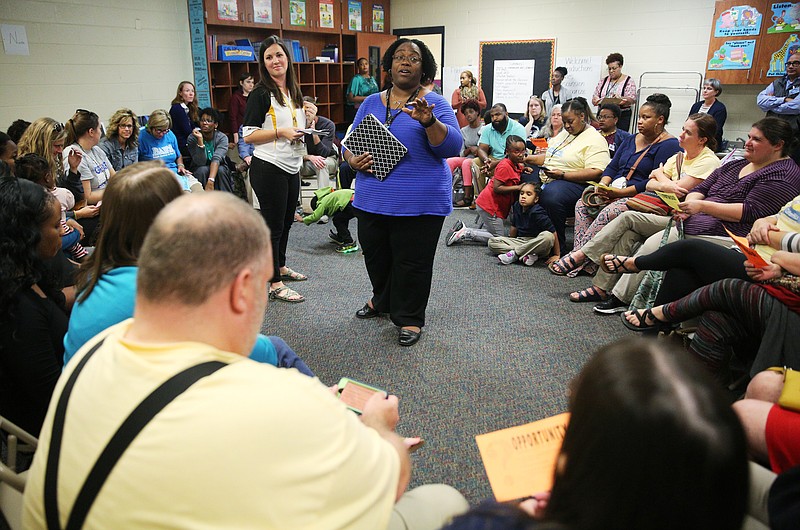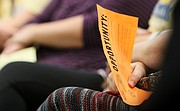The Hamilton County Department of Education held a round of group discussions Tuesday as it kicked off its new Opportunity Zone.
The zone is designed to support 12 of the district's struggling schools. It includes schools in the Brainerd High and Howard School feeder patterns and provides more staff, targeted support and a heightened urgency for improvement.
School Superintendent Bryan Johnson worked with his team, principals and the community to form his plan for the Opportunity Zone, which will work in conjunction with the state's Partnership Zone, which is also aimed at boosting the performance of underperforming schools. How that collaboration will work will be discussed in the coming months as the county and state continue discussions about what exactly how the Partnership Zone will look.
"We desire the school system to be the fastest-improving school system in the state of Tennessee," Johnson said. "And we firmly believe that what happens within these 12 schools will be catalytic and critical to the success of our system."
Students, parents and teachers attended Tuesday's event, their cars filling Orchard Knob Elementary School's parking lot, a neighboring church parking lot and lining the surrounding streets. The large crowd gathered briefly in the school's gym as Jill Levine, chief of the Opportunity Zone, introduced the zone's leadership team.
Attendees then gathered in breakout sessions to discuss what "opportunity" looks like for the children attending the schools and how to make that happen.
"You can do whatever you want to do with strategy," Johnson said before the crowd split up. "But if the culture isn't right, then nothing else matters. What we see tonight is the culture has shifted. There's an expectation for excellence."
Four rooms were designated for small groups of parents from each of the 12 schools in the Opportunity Zone. Teachers and other school faculty gathered in another room, and other community members gathered in a sixth room.
In the teacher group, they discussed better ways to prepare students for life after graduation. One idea was showing students how to develop better problem-solving skills. Many agreed that would be the foundation students need to be post-secondary ready, but it's not taught as much as it needs to be because it's not what is on the standardized tests.
"We know that's how we should teach, but that's not how the test is," one teacher said.
Lori Cleveland, a teacher at Orchard Knob Elementary, said when she was in school, students had the option to follow a career track or a college track.
"If you weren't interested in college, you didn't have to take the SAT, and that's OK," she said. "Now we've made it to where everybody's got to go to college. Not everybody wants to go to college."
Cleveland said teachers need to be able to prepare people to make a living.
However, the question with that model is "who makes that decision and when," Marie Dean, a teacher at Brainerd High School, said.
"Is that something we're preparing a student to decide at any moment, which track they want to be on, or is that something where they're going to be tracked by an adult early on?" Dean asked. "I agree that there are more opportunities than college, it just takes some thought about how to really prep for goals."
In another room, school officials asked students in what Opportunity Zone schools need.
One student said she thought more time for study hall was needed. A parent said teachers should circle back around more to students who maybe didn't understand a quiz or test, leading them to have a bad grade.
As the sessions ended, parents coming out of their small groups said they were happy with the turnout and the engagement, and they hope it wasn't a one-time thing.
"It was good to know we're not the only parents that feel the same way, just wanting to get the community more involved with our schools," said Latoia Glatt, a Calvin Donaldson Elementary School parent.
She said she hopes things will pick up and the community will come together for the children's sake.
"Our kids, they're looking up to us, and we really need to be offering them more," she said.
Marvin Roseberry, a Hardy Elementary School parent, said this was the first time the schools have asked parents and other stakeholders to gather and discuss what they think needs to happen in the schools.
"It should be ongoing, and it should be every year, because needs change every year," Roseberry said.
Contact staff writer Rosana Hughes at rhughes@timesfreepress.com or 423-757-6327. Follow her on Twitter @HughesRosana.

